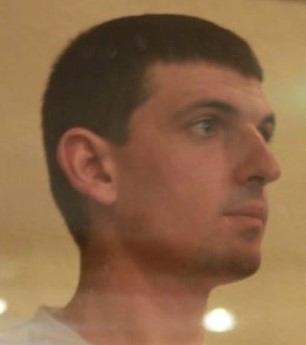• Topics / Victims of political repression
• Topics / Human Rights Abuses in Russian-occupied Crimea
Russia’s Crimean Conveyor Belt of Repression: Rustem Vaitov

Crimean Tatar Rustem Vaitov is one of the ’Sevastopol 4’, the first four Ukrainian Muslims to have been arrested in Russian-occupied Crimea and later sentenced by a Russian court to five years or, in one case, much more for unproven ‘involvement’ in the peaceful Hizb ut-Tahrir organization which is legal in Ukraine.
Vaitov turned 31 on July 28, his third year in Russian imprisonment, first in occupied Crimea, then in Russia. He is an ecologist by profession, but had been working as a builder near his home in Sevastopol. His wife, Aliye Padosheva, gave birth to their first child, a daughter, shortly after his arrest.
Arrest
He was arrested, together with Ruslan Zeytullaev and Nuri Primov on January 23, 2015, with Ferat Saifullaev taken prisoner in April that year.
There were gross irregularities even during the detention hearings, and the four men were prevented from being represented, as they wished, by lawyer Emil Kurbedinov. There were overt attempts to intimidate people coming to the detention hearings to show solidarity, with a police officer even wandering around videoing those present.
The charges
Vaitov, Primov and Saifullaev were all charged with ‘taking part in a terrorist organization’ under Article 205.5 § 2 of Russia’s criminal code, while Zeytullaev was accused of ‘organizing’ it (Article 205.5 § 1).
The charges pertained solely to alleged involvement in Hizb ut-Tahrir.
Evidence against Hizb ut-Tahrir
None. The organization is legal in Ukraine and most western countries, and there is no evidence that its members have committed acts of terrorism or violence anywhere. Russia declared it terrorist without providing any explanation, and now regularly sentences men to huge sentences merely on charges of being members. All those convicted on such charges are recognized by the authoritative Memorial Human Rights Centre as political prisoners.
Evidence against the four Sevastopol Muslims
The only ‘evidence’ against any of the men came from a video in which they discussed the political situation in Crimea, before and after it came under Russian control. The discussion was deliberately provoked and illicitly videoed by an FSB informer.
Aside from a former Ukrainian SBU officer with a known axe to grind against Zeytullaev and Saifullaev, almost all the other ‘prosecution witnesses’ retracted testimony they had allegedly given earlier, or denied having said what was asserted of them. Even the FSB’s ‘secret witness’, who spoke from another room with obvious prompting still gave confused and contradictory testimony.
It should be stressed, as did Memorial HRC, when it recognized them as political prisoners long before the gravely flawed trial ended that Russia is already in breach of international law by conducting any trials under Russian law on occupied territory.
The trial
Even the judges at the Rostov Military Court (in Russia) balked at providing the sentences demanded. Lacking the courage to acquit the men, they sentenced Saifullaev. Vaitov and Primov to the minimum 5 years possible under the article of the criminal code, and reclassified the charge against Zeytullaev to ‘involvement’. The FSB required an ‘organizer’ and challenged the latter ruling, with a second court proving more compliant, though still sentencing Zeytullaev to 12 years, not the original 7 and not the 17 demanded by the prosecution. The prosecutor challenged that ruling as well and on July 27, Russia’s Supreme Court added three years to the sentence. All four men’s convictions are already or, in Zeytullaev’s case will now be, the subject of applications to the European Court of Human Rights. .
Imprisonment
See: Crimean Tatar political prisoner punished in Russia for refusal to act as informer
Address
Please write to Rustem. If it is difficult to write in Russian, even the message below, perhaps with a photo would still tell him and Russia that he is not forgotten.
640008, Kurgan, Chasovaya St, 2, 40 г. Курган, ул. Часовая 2-я, 40,
Vaitov, Rustem Mamutovych, born 1986
Добрый день,
Желаю Вам здоровья, мужества и терпения, надеюсь на скорое освобождение.
Мы о Вас помним.
[Hello, I wish you good health, courage and patience and hope that you will soon be released. You are not forgotten]
[С днем рождения! Happy Birthday! ]
Birthday 28 July
More details about the trial and all four men’s addresses can be found here





